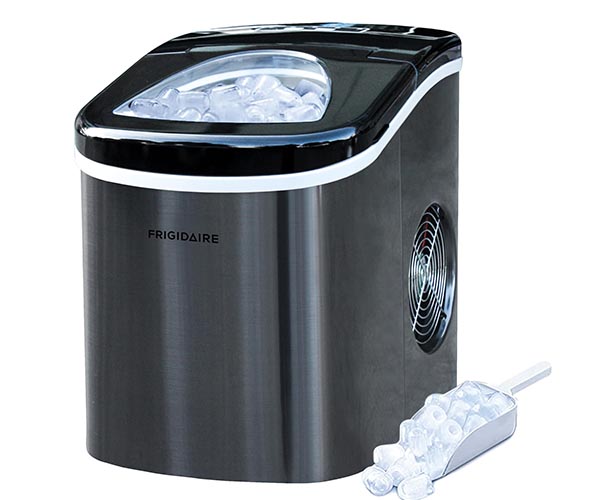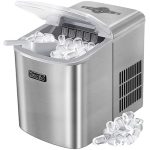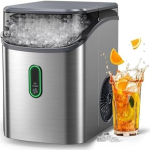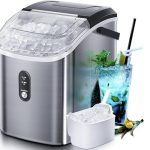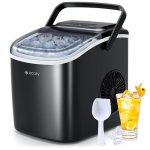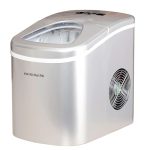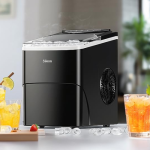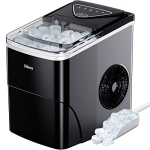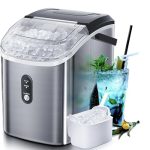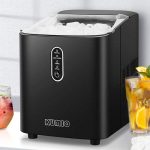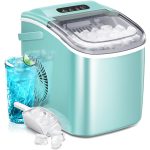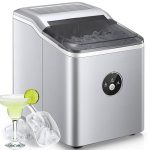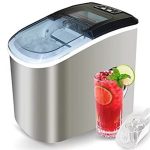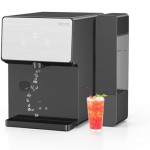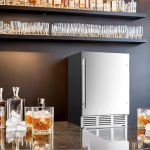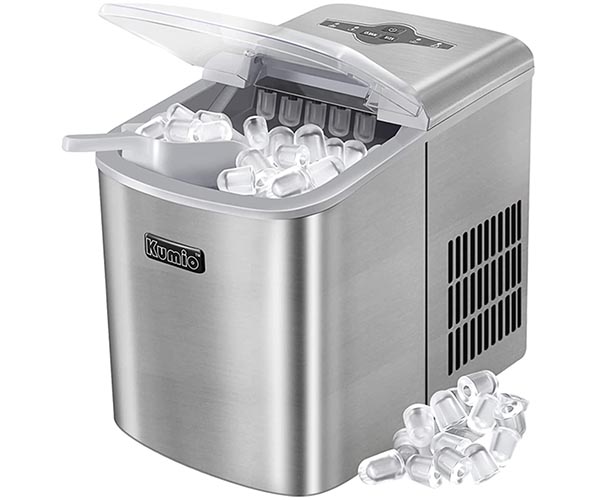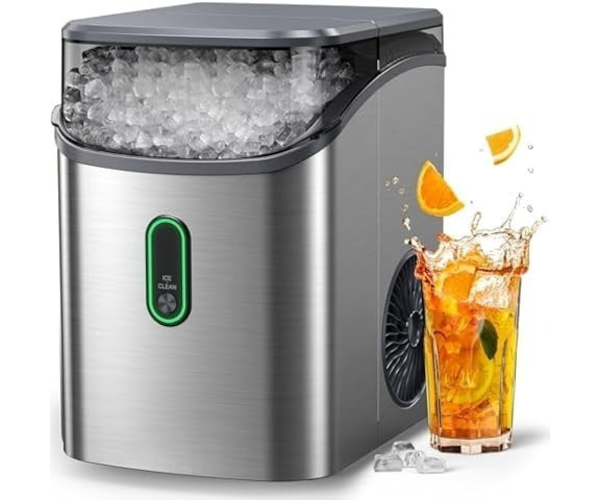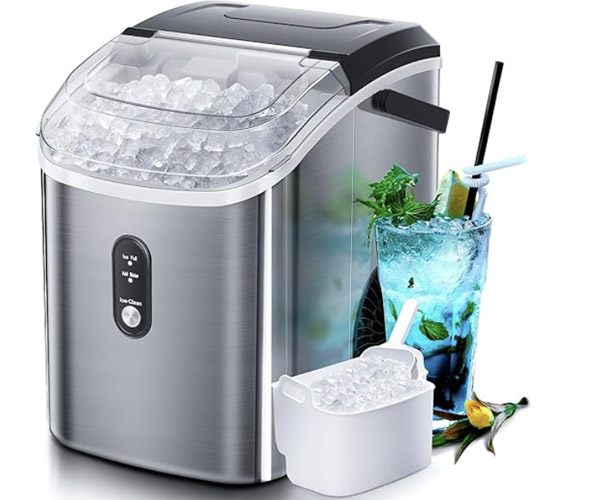Introduction
Have you ever stood in front of your countertop ice maker, cleaning agent in hand, frozen by the question, “Is this really safe to use on my machine?” You’re not alone. Many owners of these handy kitchen gadgets face the same dilemma, navigating a sea of products and DIY solutions, each claiming to be the ultimate solution for cleanliness and safety. Yet, choosing the wrong cleaner can do more harm than good, potentially damaging your appliance or affecting the quality of ice it produces.
Understanding the importance of safe cleaning is crucial not only for the efficiency and performance of your ice maker but also for its longevity. Using the right cleaning agents ensures that your machine remains in top working condition, free from harmful residues and buildups that can impede its function. In this guide, we’ll delve into the world of cleaning agents suited for countertop ice makers, helping you make informed decisions that keep your device sparkling clean and operating smoothly. Let’s clear up the confusion and set the stage for maintaining your ice maker with confidence and safety. https://amzn.to/3WoePQf
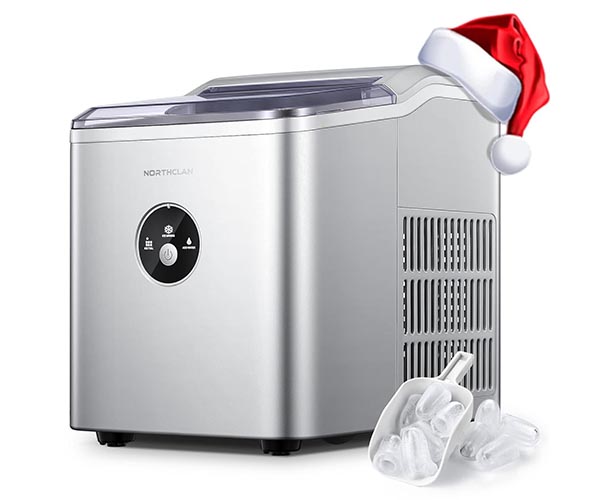
Understanding Your Ice Maker
To effectively maintain your countertop ice maker, it’s crucial to know which parts of the machine require regular cleaning and why keeping these components clean is so important for its overall functionality and the quality of ice it produces.
Basic Components
Here are the key components of your countertop ice maker that need regular attention:
- Water Reservoir: This is where water is stored before being frozen into ice. It can be a breeding ground for mold and bacteria if not cleaned regularly.
- Ice Making Tray: This component holds the water that freezes into ice. Residue and mineral deposits can accumulate here, affecting ice quality.
- Ice Storage Bin: Where the ice is stored after being made, this area should be kept clean to prevent ice from absorbing odors or getting contaminated.
- Water Filter: If your ice maker has a built-in filter, it will need regular checks and cleaning to ensure clean water for ice production.
- External and Internal Surfaces: These include the body of the ice maker and any accessible mechanical parts. Keeping these clean ensures the machine operates smoothly and remains hygienic.
Why Proper Cleaning Matters
Proper cleaning of your ice maker has a profound impact on both the performance of the machine and the quality of ice produced:
- Prevents Buildup: Regular cleaning prevents mineral and lime scale buildup, which can hinder the efficiency of the ice making process and lead to mechanical breakdowns.
- Ensures Taste and Quality: Clean components help produce clear, taste-free ice. Contaminants or residue in the machine can impart unpleasant flavors or odors to the ice.
- Maintains Efficiency: A clean ice maker operates more efficiently, using less energy to produce ice and functioning at optimal speeds.
- Extends Appliance Life: By preventing corrosion and wear from buildup and contaminants, regular cleaning extends the lifespan of your ice maker.
By understanding these critical components and the importance of keeping them clean, you can ensure that your countertop ice maker continues to function efficiently and produce high-quality ice. Regular maintenance not only supports the performance of the ice maker but also contributes to the overall enjoyment and safety of the ice you consume.
Recommended Cleaning Agents
Choosing the right cleaning agents for your countertop ice maker is essential to ensure it remains safe and effective. Here’s a breakdown of both commercial and DIY solutions, as well as common cleaners to avoid.
Commercial Solutions
There are several commercially available cleaning agents specifically designed for ice makers. These products are formulated to safely remove scale and deposits without damaging the sensitive components of your machine. Here are a few recommended options:
- Affresh Ice Machine Cleaner: This solution is designed specifically for ice makers to remove lime and mineral build-up that can be unsightly and could affect the taste of your ice. It’s easy to use and safely cleans without leaving harmful residues.
- Nu-Calgon Ice Machine Cleaner: Widely used by professionals, this cleaner removes scale deposits, ensuring that your ice machine continues to operate efficiently. It’s a non-foaming, safe acid for use in ice machines made with nickel or tin.
- EcoLab Ice Machine Sanitizer: This product not only cleans but also sanitizes, reducing the bacteria and fungi that can develop in moist environments.
DIY Solutions
For those who prefer natural alternatives or if commercial cleaners are not available, here are some DIY cleaning solutions that are both safe and effective:
- Diluted Vinegar Solution: Mix equal parts of white vinegar and water. Vinegar is excellent for dissolving mineral deposits and sanitizing surfaces. Use this solution to run through your ice making cycle, followed by several cycles of water to rinse thoroughly.
- Lemon Juice and Water: Similar to vinegar, lemon juice can be used due to its acidic properties which help in breaking down scale. Mix one part lemon juice with three parts water.
What to Avoid
While many household cleaners are effective for general cleaning, they should never be used in your ice maker due to their corrosive properties and potential to leave harmful residues. Avoid the following:
- Bleach: While effective for disinfection, bleach is too harsh for use inside ice machines and can damage the materials and internal components.
- Ammonia-Based Cleaners: These can be too abrasive and might damage the plastic and metal components of your ice maker.
- Any Abrasive Scrubbers: Physical abrasives can scratch surfaces, leading to crevices where bacteria can grow and potentially damaging the machine.
By understanding and selecting the appropriate cleaning agents for your countertop ice maker, you can ensure that it remains in excellent condition, producing high-quality ice while extending its lifespan. Always follow manufacturer guidelines and recommendations for the best results.
Step-by-Step Cleaning Guide
Maintaining the cleanliness of your countertop ice maker is crucial for ensuring its optimal performance and longevity. Here’s a detailed guide on how often to clean your ice maker and the steps to do it effectively.
Frequency of Cleaning
To maintain your ice maker in top condition, clean it regularly according to the following guidelines, which will help align with the main keyword, “how often to clean countertop ice maker”:
- Routine Cleaning: Perform light cleaning once every week to keep the machine tidy and functioning well. This involves wiping down the exterior and interior surfaces and removing any visible debris.
- Deep Cleaning and Descaling: Conduct a thorough cleaning and descaling once every month, or more frequently if you have hard water or use the machine extensively. This deep clean will address any mineral buildup and ensure all components are sanitized.
Detailed Cleaning Steps
Here is a step-by-step guide to effectively clean your countertop ice maker using the recommended cleaning agents:
- Preparation:
- Turn off and unplug the ice maker.
- Remove any remaining ice and water from the machine.
- Applying Cleaner:
- If using a commercial cleaner, follow the instructions on the label for proper dilution and application. For DIY cleaners like diluted vinegar or lemon juice, prepare your solution.
- Pour the cleaning solution into the water reservoir.
- Run Cleaning Cycle:
- Turn on the ice maker and allow it to run a full cycle using the cleaning solution. This process will circulate the cleaner through the system, breaking down any buildup.
- Rinse Thoroughly:
- After the cleaning cycle, drain the system of the cleaning solution.
- Run at least two full cycles with clean water to rinse any residue of the cleaning agent from the ice maker.
- Clean the Ice Bin and Exterior:
- Remove the ice bin and wash it with warm, soapy water, then rinse it thoroughly with clean water.
- Wipe down the exterior of the ice maker with a soft cloth dampened with a mild detergent solution.
- Dry and Reassemble:
- Dry all components thoroughly with a clean towel before reassembling the machine.
- Ensure everything is correctly positioned, and then plug in the unit.
- Post-Cleaning Operation:
- Allow the ice maker to produce one batch of ice, discard this batch to ensure that any residual cleaner is completely removed.
By following these steps, you can ensure that your countertop ice maker is not only clean but also maintains its efficiency and produces high-quality ice. Regular maintenance is key to extending the life of your appliance and ensuring it performs at its best. https://amzn.to/3WoePQf
Signs Your Ice Maker Needs Cleaning
Recognizing when your countertop ice maker needs cleaning is key to maintaining its performance and ensuring the quality of the ice it produces. There are several tell-tale signs that indicate it’s time to clean your machine, ranging from physical indicators to changes in the smell and taste of the ice.
Physical Signs
Keep an eye out for these physical signs that suggest your ice maker needs a thorough cleaning:
- Cloudy Ice: If the ice is not as clear as usual and appears cloudy, it’s a common sign that there are impurities or mineral buildups in the machine.
- Slow Ice Production: A reduction in the speed at which ice is made can indicate that there are clogs or buildups affecting the ice maker’s efficiency.
- Small or Incomplete Ice Cubes: When the ice cubes are smaller than usual or seem to be formed incompletely, it could be due to restricted water flow caused by mineral buildup.
- Visible Scale or Mold: Any visible signs of scale, mold, or mildew within the ice maker, especially around the water reservoir or ice tray, demand immediate cleaning.
Smell and Taste Signs
Changes in the smell and taste of the ice are clear indicators that your ice maker requires cleaning:
- Unusual Tastes: If the ice begins to impart a strange taste to beverages, it’s likely that the ice maker has developed bacterial or fungal growths, or that old food particles have made their way into the machine.
- Off-Putting Smells: Ice that emits an unpleasant odor is a strong indicator of mold or mildew accumulation within the machine, particularly in the ice storage bin where ice can absorb odors.
By being attentive to these signs, you can ensure timely cleaning of your ice maker, which is crucial for maintaining the machine’s functionality and ensuring that the ice it produces is both safe and pleasant to use. Regular maintenance not only prevents these issues but also extends the lifespan of your appliance, keeping it running efficiently for years to come.
Professional Cleaning Services
While regular DIY maintenance can keep your countertop ice maker in good working order, there are circumstances where the expertise of a professional cleaning service is invaluable. Understanding when to call in the professionals and how to choose the right service provider can ensure your ice maker receives the best possible care.
When to Hire Professionals
Consider hiring professional cleaning services in the following situations:
- After Long Periods of Inactivity: If your ice maker has been unused for an extended period, a professional cleaning can address any issues that may have arisen during downtime, such as mold growth or stale odors.
- Persistent Problems: When regular cleaning doesn’t resolve issues like slow ice production, strange tastes, or mechanical malfunctions, professional services can provide a deeper clean and more thorough maintenance.
- Complex Systems: Some high-end or commercial ice makers have complex components that benefit from the skilled handling of a professional who is familiar with that particular model.
- Preventative Maintenance: To extend the lifespan of your ice maker and ensure it operates at peak efficiency, schedule annual or bi-annual cleanings with a professional service.
Choosing a Service Provider
Selecting a reliable professional cleaning service for your ice maker involves several considerations:
- Specialization: Look for service providers that specialize in appliance maintenance, particularly those with experience in servicing ice makers.
- Certifications and Reviews: Check for certifications and read customer reviews to assess the reliability and quality of the service provider.
- Recommendations: Ask for recommendations from the manufacturer of your ice maker or consult online forums and local businesses for trusted technicians.
- Service Details: Inquire about the specific services offered. Ensure they include comprehensive cleaning and maintenance checks that align with the needs of your ice maker.
- Cost and Warranty: Compare cost estimates from different providers and check if they offer service warranties that provide value beyond the immediate cleaning.
By carefully selecting a professional cleaning service, you ensure that your ice maker is not only cleaned effectively but also maintained in a way that maximizes its efficiency and longevity. This helps prevent future issues and maintains the quality of ice produced, safeguarding your investment in the appliance.
FAQs About Countertop Ice Maker Maintenance
1. How often should I clean my countertop ice maker?
Answer: It’s best to clean your countertop ice maker at least once a month to ensure optimal performance and cleanliness. If your water is hard or if the ice maker is used frequently, consider increasing the cleaning frequency to prevent buildup and maintain ice quality.
2. What cleaning solution should I use for my ice maker?
Answer: You can use commercially available ice maker cleaners that are specifically designed for the task, or a homemade solution of equal parts white vinegar and water. Both options will effectively remove mineral buildup and sanitize the machine.
3. Can I use bleach to clean my ice maker?
Answer: No, you should avoid using bleach to clean your ice maker as it can be too harsh on the machine’s components and may leave harmful residues. Stick to manufacturer-recommended cleaners or mild DIY solutions like vinegar or lemon juice.
4. What are the signs that my ice maker needs a deep cleaning?
Answer: Signs that indicate a need for deep cleaning include slow ice production, smaller than usual ice cubes, cloudy ice, or unpleasant tastes and odors in the ice. These issues often arise from mineral buildup or mold and mildew growth.
5. Should I hire a professional to clean my ice maker?
Answer: If you encounter persistent issues that regular cleaning does not resolve, or if your ice maker is a complex commercial model, hiring a professional is advisable. Professionals can also perform preventative maintenance to extend the life of your machine.
6. How do I choose a professional service for cleaning my ice maker?
Answer: Look for professionals who specialize in appliance repair and maintenance, particularly those with experience in ice makers. Check their certifications, read customer reviews, and compare service costs. Recommendations from the manufacturer or trusted sources can also guide you to reliable services.
Conclusion
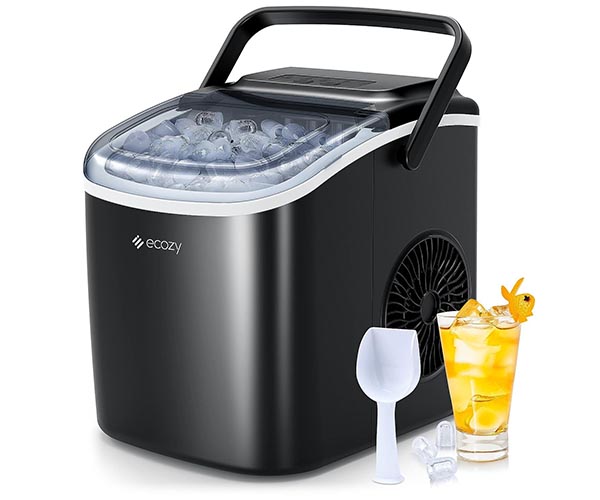
Maintaining your countertop ice maker is crucial not only for the longevity of the appliance but also for the quality of ice it produces. Using safe cleaning agents and following proper cleaning protocols ensures that your machine operates efficiently and continues to produce clean, fresh-tasting ice. Regular cleaning prevents buildup, wards off unpleasant odors and tastes, and helps avoid mechanical issues that could lead to costly repairs.
Call to Action
Don’t wait for signs of trouble before you decide to clean your ice maker. Schedule regular cleaning sessions and mark them on your calendar as a routine maintenance task. For those who prefer a hassle-free approach, consider setting up a maintenance contract with a professional service. Additionally, continue to educate yourself on the best practices for ice maker maintenance by exploring further resources available online or from your appliance manufacturer. Proper care today ensures trouble-free operation and fresh ice tomorrow.
Additional Resources
For those who want to ensure their countertop ice maker remains in excellent condition, utilizing the right resources can make all the difference. Below, find a curated list of recommended commercial cleaning agents and professional services specializing in ice maker maintenance.
Links to Cleaning Products
When choosing cleaning agents for your ice maker, it’s important to select products that are both effective and safe for use on your specific appliance. Here are some highly recommended options:
- Affresh Ice Maker Cleaner: Specifically formulated for ice makers, this cleaner helps remove lime and mineral build-up that occurs in all ice machines. It is safe for all types of ice makers.
- EcoLab Ice Machine Cleaner: This is a nickel-safe cleaner designed to remove scale build-up from ice machines with nickel-plated or tin-plated evaporators. It is effective and easy to use.
- Nu-Calgon Nickel Safe Ice Machine Cleaner: This is another excellent choice, widely used by professionals, that effectively removes mineral deposits and helps maintain the efficiency of the ice maker.
Professional Services
For comprehensive maintenance or when facing complex issues, professional services can provide thorough cleaning and maintenance. Here are some options to consider:
- Sears Home Services: Offers comprehensive appliance repair and maintenance, including for ice makers, with certified and experienced technicians.
- Mr. Appliance: Specialized in ice maker and other appliance repairs, they offer expert service and can handle both minor and major issues.
- Local Appliance Repair Services: Check for local services with positive reviews and a reputation for reliability. Local businesses often provide quicker services and may have experience with a wide range of models. https://amzn.to/3WoePQf
By utilizing these resources, you can maintain your ice maker in optimal condition, ensuring it operates efficiently and continues to produce high-quality ice. Remember to review and ensure compatibility with your specific model before using any product or service.
References
- GE Profile Opal Nugget Ice Maker Product Page
- NewAir Countertop Ice Maker Product Page
- Igloo ICEB26HNBK Portable Electric Countertop Ice Maker Product Page
- Scotsman SCN60PA-1SS
- EUHOMY Nugget Ice Maker Countertop
- Silonn Ice Maker Countertop
Additional Resources
- [How often should you clean your countertop ice maker?]
- [What happens if you don’t clean your countertop ice maker regularly?]
- [How does a countertop ice maker work?]
- [How to install a countertop ice maker?]
- [How often to descale a countertop ice maker?]
- [Buying Guide: Countertop Ice Makers with Water Line Connection]
- [Kitchen Upgrade Ideas: Countertop Ice Makers with Water Line]
- [Which countertop ice maker with freezer is best?]

